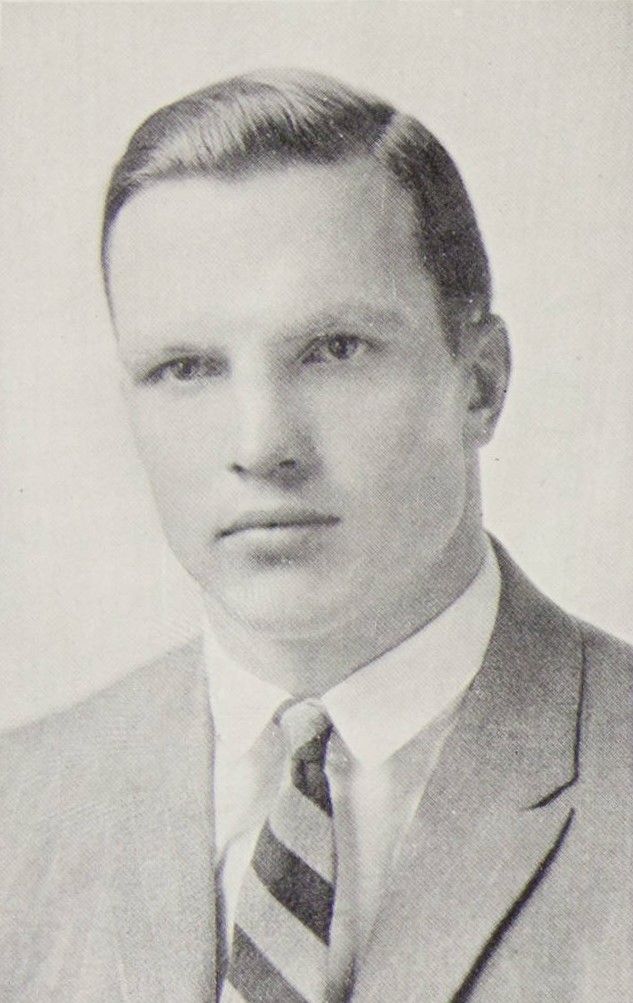DePaul’s football team has faded more and more into history as the years have gone by. While the occasional story does cover DePaul’s football team and its demise, specific stories about the coaches and players are told less often. One such story is that of the football team’s coach from 1925-31, Edward Anderson. Over his coaching career at four colleges, Anderson amassed a record of 201-128-15, which earned him a spot in the College Football Hall of Fame in 1971. However, Anderson’s success as a football coach is only a part of his story.
When DePaul hired Anderson as the new football coach in 1925, the excitement on campus was obvious. “The DePaulia” gushed about Anderson’s past as the captain of the football team while at the University of Notre Dame, where he played under the legendary Knute Rockne. He also spent three years coaching the football team at Columbia College, now Loras College, in Iowa, where he went 16-6-2. The article ends with, “The students in the university are proud to know that their team is to be guided by a Notre Dame man, particularly a man like Anderson. The whole school is behind you, Eddie!”
Despite the buzz, there are quite a few notable facts about Anderson that it leaves out. While the article focuses on the football team, Anderson also was brought in to coach DePaul’s basketball team, which he would lead to the Western Interstate Conference Championship during his inaugural year.
 Eddie Anderson in 1926. (Image courtesy of Special Collections and Archives)
Eddie Anderson in 1926. (Image courtesy of Special Collections and Archives)
Additionally, Anderson was a rather busy man. Along with his coaching duties at DePaul, Anderson was also playing football professionally with the Chicago Cardinals, now the Arizona Cardinals, and attending medical school at Rush Medical College. In fact, the most attention these activities ever garnered during his time at DePaul was in a 1929 “The DePaulia” article about his wedding. Rather tongue-in-cheek in nature, the article notes, “Since the time Eddie has come to Chicago he has not confined his time to mere coaching of football, but he has played a little of the pro brand. Besides this more or less trivial way of spending his time, Eddie determined to become a medico and has spent a handful of his time studying for such.”
However, this failure to mention Anderson’s accomplishments is not due to students being unimpressed with everything he was doing. Rather, their genuine affection for Anderson was based in his skill as a coach and, more importantly, his personality. The article about Anderson’s wedding goes on to say they do not begrudge Coach Anderson his new bride, as they know he has a large heart. A February 1927 article in response to the exclusion of Anderson’s name in sports writers’ lists of coaches of note applauds not only his impressive coaching records in both football and basketball, but also “his magnetic personality…[which] may be held accountable for the way the teams fight for him during the season.” In fact, most of everything written about Anderson in both the newspaper and the yearbook highlights his personality and how well-liked he is, some even going so far as to blame losses on players who were “less than average material” rather than put any blame on the beloved “Doc” Anderson.
When Anderson resigned from DePaul in March of 1932, the reaction was both swift and long-lasting. For weeks following his resignation, “The DePaulia” featured an article about how much his presence on campus would be missed. The most notable, perhaps, is actually a reader letter from a student whose freshman year at DePaul Academy coincided with Anderson’s first year as coach, and subsequently followed Anderson throughout his high school and college years. This fan writes, “The men that worked under ‘Eddie’ have nothing but praise to offer him along with a regretful goodbye; and the fans that have cheered through the seven years that he has led his elevens, shall forever remember the fine spirit and manliness that are his. We are one in wishing ‘Eddie’ the inevitable success he deserves.”
Of course, while DePaul’s football program was winding down, Anderson’s career was just beginning. He went on to coach at the University of Iowa and, for a combined 19 years, at the College of the Holy Cross, where he finished with a 129-67-8 record and become the fourth coach in college football history to reach 200 wins. He also continued to practice medicine throughout this time and after he retired from college football in 1964.
As noted, however, DePaul had moved away from football. Anderson’s 1971 induction into the College of Football Hall of Fame went completely unobserved by “The DePaulia;” even a 1973 article exploring past sports at DePaul only mentioned him in a list of basketball coaches. This is, arguably, understandable: despite its best attempts, DePaul was never destined to be a football school. Anderson’s sports legacy isn’t forgotten - he remains well-respected and remembered at both Iowa and Holy Cross.
Perhaps the reasons for Anderson’s popularity while he was at DePaul say more about him than his football record. As a Vincentian institution, DePaul has always valued kindness and helping others. It is understandable a football coach who moonlights as a doctor would be well-liked at DePaul - Eddie Anderson was someone who went out of his way to help others. Though his name may not be recognizable to the average DePaul student today, Anderson’s legacy is recognizable as Vincentian in his commitment to both his football teams and his patients.